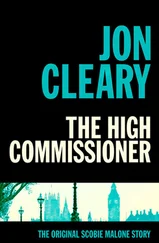1 ...6 7 8 10 11 12 ...18 “Generous to a fault,” said Jack Savanna.
“—Those days and those mistakes are past.” He stopped, suddenly lost, as if he had just realised he wasn’t on the parade ground and that the men in front of him couldn’t be dismissed. He brought his hands from behind his back and shoved the right one, with its stumps of fingers, into his jacket pocket. He had dropped his parade ground voice when at last he said, “I was hoping we could make a new start.”
It was Jack Savanna who answered. Vern knew that, with his rank, he was the one who should have answered for the men and while Caulfield had been talking he had been searching for the words to reply to him. But now they wouldn’t be needed. Jack, drawing himself up to his full height, his hat pushed back on his head, his sweeping moustache accentuating the curl of his lip, had taken over.
“I doubt that your brain, Caulfield, shrivelled as a piece of old copra, could understand how we feel about you. You were all right as a soldier, perhaps—at least you had guts, which not all of us profess to have. But you weren’t a man, that’s our complaint. We know something of your background, that you spent fifteen years in New Guinea before you came into the Army, and perhaps that’s to blame. I’m told that only missionaries and fools treat boongs as human beings—and you had some idea that everyone in the Army was a boong.” Jack cocked an eye at Charlie Fogarty. “You will forgive my using the term boong, Charlie? I am trying to speak in this bastard’s language.”
“Go ahead,” grinned Charlie. “In the tribe we’d call him a white boong.”
“Stay out of this, darkie!” Caulfield snapped.
The men straightened up and Vern tense, ready to step in front of Jack Savanna, expecting the latter to swing his fist into Caulfield’s furious red face. He had seen Jack in action several times when he had lost his temper; time and place meant nothing to him if he thought a swung fist was the answer needed. Caulfield seemed suddenly aware that his incautious tongue had gone too far again, and he took a step back. He was pressed against the crowd as against a wall, his eyes flickering over the men without fear but expecting them to move towards him, and Vern waited for the moment to blow up.
“Sock the bastard!” Mick Kennedy snarled.
“Pull your heads in,” Vern said, and tried to sound reasonable and not like an officer throwing his weight around. “He’s not worth the strife it would cause. There’s a copper over there.”
“You’re right, Vern.” Jack Savanna was surprisingly calm. He looked again at Charlie Fogarty. “Although we’ll hit him if you like, Charlie.”
“Skip it,” said Charlie, and looked at Caulfield with a dark, impassive face. He’s got more dignity than the rest of us put together, Vern thought.
Jack turned back to Caulfield. “You’re fortunate, Caulfield. But don’t ever make a remark like that again while we’re around. You’ve just illustrated what I was saying about your thinking everyone in the Army is a boong. It may surprise you, but to every one of us here, Charlie is just a man who’s a little more sunburned than the rest of us. But you would never be able to see it that way. You have to be a man, Caulfield, to know how to treat men properly. And you never knew how to treat us. If the boongs disliked you as much as we did, then I shouldn’t go back to New Guinea if I were you. Not now, when they could blame your death on the Japs.”
Caulfield’s face got redder, the freckles turning almost black, but before he had a chance to speak the men had turned back to the bar; and there was that little island of silence again in that sea of noise. Vern stood there waiting for the burst of temper that they all knew of old.
But Caulfield just muttered, “You’ll be sorry for this,” and when Vern looked back over his shoulder he had gone.
“I’ve been waiting to say that for two bloody years,” said Jack. “In the circumstances I thought I was remarkably restrained.”
“Too bloody restrained,” said Mick Kennedy. “I’d of jobbed him if I’d been closer to him.”
“I wanted to job him,” said Bluey. “Trouble is, my days of jobbing people are over. Even with that bung hand of his, he’d have knocked me arse-over-Bluey.” He looked wistfully into his glass. “You miss a lot when you get past forty.”
“‘I’m another bloke,’ he said.” Joe Brennan almost spat into his beer. “‘Let’s make a new start.’ Christ, what does he think we are, lovers?”
“Now in the tribe,” said Charlie Fogarty, and sipped his shandy, “we would’ve pointed the bone at him, and he’d of been dead in a week. You blokes are too civilised.”
Vern had been thinking of all they had had to put up with in the time Caulfield had been with them. The sarcastic arrogant way he had of talking to the men; the looking after his own comfort and ignoring that of those under him; the trivial rules instituted just to show his authority. The company after a while had called itself Caulfield’s Boongs, and had put up with him with good-humoured resignation. Then the good humour had begun to run dry and threats were muttered against him. On the trip to the Middle East he had headed the shark-bait list; but somehow he had landed safely in Palestine and had survived the months spent there and at Mersa Matruh. Then the battalion had gone into the Syrian campaign and he had had his hand mangled by a shell splinter, and he had been invalided home to the accompaniment of loud cheers from the men. Vern had never seen anyone hated so much, and now here was the man daring to come back and ask that the past be forgotten. Was he so thick-skinned or just blind or did he have more guts than the men, though reluctantly, had conceded him? And what had he meant by his remark that they would be sorry?
Chapter Three
JACK WATCHED Vern Radcliffe board the tram, waved at him, then turned away with the feeling of being lost that had kept recurring ever since they had first landed back at Adelaide. Vern had asked him home for dinner, and he had almost accepted. But then he had recognised the invitation for what it was, sincere but a spur-of-the-moment thought; he had thought of Dinah sharing the moments with her husband after two long years, and so he had told Vern he had a date.
Well, he’d better see if he did have a date. He crossed the road to St. James station, lined up outside the phone box and ten minutes later was dialling a number, conscious of the thick stuffy smell of the box and the belligerently impatient queue outside.
“Rita? This is Jack here.”
“Jack? Jack who?” Her voice sounded the same, light and empty as her head.
“Jack Savanna. How many Jacks do you know? They had once lived together for three months, but now she had forgotten him. He grinned to himself and patted his bruised ego.
“Jack Savanna! Well, Ah declare! How you been, huh?” Her voice had changed, after all: it had crossed the Pacific. “Long time no see, Jack, honey.”
Why did I ring her? he thought; and thought what a trap was the telephone. In the old days, when one had to write a letter there was always time for a second thought. But now: two pennies in the slot, a spin of the dial, and bingo! Why had he called her? Rita, with the blank pretty face, the pretty blank mind and the beautiful body—yes, that was why he had called her. “I’ve missed you, too, Rita, honey. How about dinner to-night, and afterwards we can talk about old times, huh?”
“Ah gee, Jack honey, if I’d only known! But I already gotta go out—I’m gonna see”—he could hear her two-stroke brain changing gears—“my aunt.”
“Your ant? Are you interested in entomology now?”
Читать дальше












